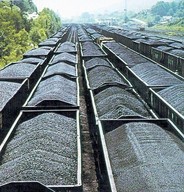The season of shipping woes is creeping upon us. One of the Christmas gifts that you ordered online has inevitably been added to the list of backordered items. Will it get to you on time or will you have to hand someone a gift box with an IOU inside? How would you like to be a business owner than needs a commodity to do business, but can’t get delivery? Many of the nation’s coal fired power plants are dealing with shipping woes when it comes to coal delivery.

The coal industry ships two thirds of its product by rail to plants across the nation. Problems with shipping were evident last year as rail companies’ bumped coal for crude oil and grain shipments. With the very cold winter that followed, demand for energy increased. The weather hampered efforts to ship needed coal to plants and many were left with shrinking reserves. This condition has continued through the spring and summer causing some generator operators to shut down in order to conserve fuel and as a result, force them to purchase power off of the open market. It is true that coal can be shipped by water or truck, but the location of the plant and the size of shipments can make both of these methods unsuitable.
Public Power Magazine reported that North Dakota- based Basin Electric Power Cooperative was forced to find alternatives to supply fuel to one of their plants. Basin was forced to ship lignite coal to its Leland Olds Station for 30 days in January due to weather and competition with oil deliveries. Basin has since worked on building stockpiles and working with rail owners to try to avoid this situation.
Rail delivery isn’t only affecting power plants. Coal companies lose money when their product can’t be delivered. Peabody Energy, a large coal processor in the Powder River Basin estimated that 15 million tons of coal shipments were missed in the first half of the year due to poor rail service and customer conservation measures. This has also affected numerous other commodities and caused several trade organizations to join forces to seek reform.
Many people are mentioning the word “monopoly.” A large amount of product has to be shipped to these locations and there are few modes of transport that can accomplish this. Most rail customers only have one choice, so there is no competition. Costs incurred by shippers have increased 90% from 2005 to 2011, even if carload volume has decreased 1.1% during the period. Escalation Consultants, a rail and energy advising company, gathered these numbers for Consumers United for Rail Equity, a coalition of freight shippers. Does this at all sound familiar?
Railway reform took place in the late 1800’s to stop rail monopolization. Rail was the only game in town. As the US built west, rail service eliminated the need for settlements in the west to become self-sufficient because products could be shipped from the east by rail. Rail companies saw this as a golden opportunity and filled their pockets with huge profits by charging farmers and producers to ship their products. As regulations were created to correct the problem, they also crushed most of the rail companies in the 1970’s. Of the 26 rail carriers that existed in the 1970’s, only 7 remain today. BNSF Railway is the product of over 400 rail lines that have been consolidated.
Many groups including APPA, NRECA, and EEI are urging FERC to examine railroad coal delivery. Rail carriers indicated to the Surface Transportation Board which provides regulatory oversight, earlier this year that most of the issues would be resolved in 2014. BNSF Railway indicated in September that problems will continue at least through 2015. These groups are urging the STB to require rail companies to submit plans to correct coal delivery problems and prevent generation disruption. Rail companies have responded with investments in capital improvements and plans to hire additional employees to address the issues. We will have to wait and see if this plan works or be forced into conservation mode again this winter. By the way, less than 30 days til’ Christmas!
Works Cited
Wood, Elisa. "Trains Late: So Much Coal, But so Hard to Get." N.p., n.d. Web.

 RSS Feed
RSS Feed
